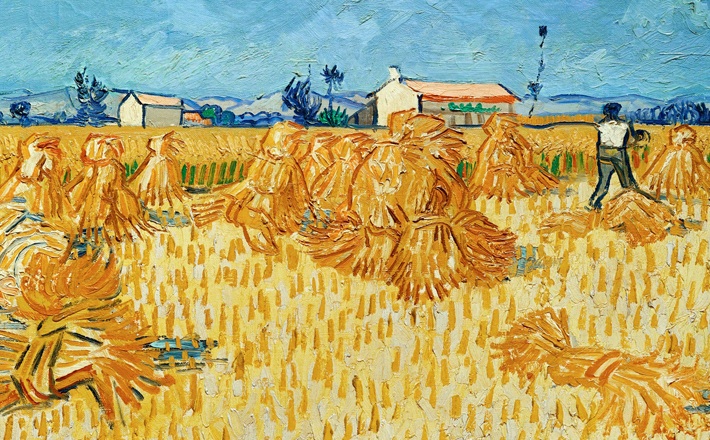Commentary on Psalm 66:1-9
Chosen for a Sunday toward the end of the liturgical season of Ordinary Time that confirms the constancy of grace manifested mysteriously in the middle of doldrums, Psalm 66 blows in fresh air with its jubilant call for joy — a common thread that all scripture lessons for this Sunday share.
According to the psalmist, there is a great deal that the believing community can recall joyously from the past acts of God, and the worshippers are to continue the story of God’s goodness ever extending to encompass all the earth.
Although not transparent in English translations, the Hebrew text of v. 1 (as reflected in the Greek and Latin versions) depicts that the act of praise with a plural form of the verb, envisioning “all the earth” as a company gathered to make “a joyful noise.” The jagged reference to a “noise” is not haphazard. The psalmist apparently welcomes an outburst of joy in praise, for the quality sought is not a musical elegance but the jubilation inspired by the joy of worship. It echoes nicely the first reading from Isaiah 66:10, whose call for gladness has been the basis of the Laetare (“Rejoice”) Sunday observed as the Fourth Sunday in Lent.
The joyous shout of praise in v. 1 is shaped into a song in v. 2. This song is to have a clear goal and content. Its focus is solely on God, publicizing how great and worthy of praise God is. The psalmist wants to add his own encomium on the mighty acts of God (v. 3). He describes them as “awesome” (v. 3a). This descriptor is double-edged. On the one hand, God’s work fills the worshippers with awe, as they deliberate on what God has done and will do (as will be narrated later in this very psalm). On the other hand, it inspires fear among those who rise up against God (“[God’s] enemies,” v. 3; “the rebellious,” v. 7).
The psalmist depicts the posture of God’s enemies that “cringe before [God]” (v. 3). This posture may have an external resemblance with what the verb “worship” in v. 4 evokes, for the latter includes the idea of bowing down. However, the two acts could not be more different in intent and import. One bows for homage, and the other for the gesture of obeisance. The possibility of feigned submission in the latter apparently has led the ancient versions (e.g., the Greek Septuagint and the Latin Vulgate) to declare these enemies are lying to God.
Our psalmist finds the circle of reverential awe extended from the congregation to the world (v. 4). The expanding horizon of the Old Testament anticipates the report of the seventy sent out for mission in the gospel lesson from Luke 10. There the apostles, too, are charged with the proclamation of the reign of God and come back “with joy” (vv. 9, 17).
Psalm 66:5 starts a new section with a recitation of God’s work “among mortals.” In v. 6, the psalmist cites as its concrete examples the crossing of the Red Sea and of the Jordan (Exodus 14:21-22; Joshua 4:23). The grand narrative from exodus to the entry into Canaan is presented against the background of the symbolic world of the ancient Near East, in which the water represents the power of chaos. God’s mastery over the chaotic forces is revealed in the deliverance of God’s people (Psalm 66:6). It can also be observed in God’s sovereignty over the nations (v. 7). This reign of God over the world will be eternal, for divine governance precludes a chance that those who rise up against God can prevail. The Hebrew for “the rebellious” (sorerim) recalls another similar sounding word tsorerim (“foes”; see 8:2). Our psalmist anticipates the triumph of God’s power.
The idea of the use of might may be troublesome to modern sensitivities; however, it is an important part of the psalmist’s message that divine power delivers God’s people from helpless situations. God’s watch may well trigger the thought of divine surveillance. For the psalmist, however, it is a mark of the liberating governance of God, who keeps the powers of chaos at bay and provides an ever-present protection (as mentioned in Job 29:2).
In the last two verses of our psalm selection, the psalmist renews the call for the global worship, elucidating the tangible benefit enjoyed by him and his congregation of praise (Psalm 66:8-9). Again, the psalmist invites the peoples of the earth to celebration, as he did at the beginning of the psalm. The repeated call of praise gives an expression to the eagerness of the psalmist, who is excited to tell the world about what God has done for the people of God.
Of course, the psalmist is keenly aware of precariousness that accompanies life. The image of a slip of the feet that the NRSV presents in v. 9a conjures the perils of falls. The reference to a slip may serve as a metaphor for a death-like experience. Since the Hebrew verb for “slip” in the NRSV derives from a root that depicts something that totters due to insecurity, the psalmist may also deliberate on the threat of instability and appreciate God who keeps the faithful firm.
In the midst of the perilous journey of life, the psalmist affirms that God “has kept us among the living” (Psalm 66:9a). The affirmation of sustained life may explain why the Greek Septuagint translators were compelled to introduce this poetic piece as “a song of psalm of resurrection” in the superscription (canticum psalmi resurrectionis, Latin Vulgate). Though life is invariably accompanied by many dangers, and though history is painfully familiar with oppression and hardships, the end of life and history is going to be not death but life. There is a good reason to be jubilant with all the earth.


July 3, 2016